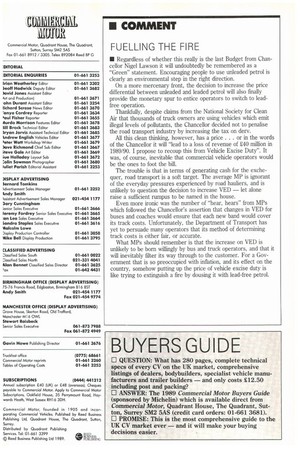FUELLING THE FIRE
Page 5

If you've noticed an error in this article please click here to report it so we can fix it.
• Regardless of whether this really is the last Budget from Chancellor Nigel Lawson it will undoubtedly be remembered as a "Green" statement. Encouraging people to use unleaded petrol is clearly an environmental step in the right direction.
On a more mercenary front, the decision to increase the price differential between unleaded and leaded petrol will also finally provide the monetary spur to entice operators to switch to leadfree operation.
Thankfully, despite claims from the National Society for Clean Air that thousands of truck owners are using vehicles which emit illegal levels of pollutants, the Chancellor decided not to penalise the road transport industry by increasing the tax on derv.
All this clean thinking, however, has a price . . . or in the words of the Chancellor it will "lead to a loss of revenue of 40 million in 1989/90. I propose to recoup this from Vehicle Excise Duty". It was, of course, inevitable that commercial vehicle operators would be the ones to foot the bill.
The trouble is that in terms of generating cash for the exchequer, road transport is a soft target. The average MP is ignorant of the everyday pressures experienced by road hauliers, and is unlikely to question the decision to increase VED — let alone raise a sufficient rumpus to be named in the house.
Even more ironic was the number of "hear, hears" from MPs which followed the Chancellor's assertion that changes in VED for buses and coaches would ensure that each new band would cover its track costs. Unfortunately, the Department of Transport has yet to persuade many operators that its method of determining track costs is either fair, or accurate.
What MPs should remember is that the increase on VED is unlikely to be born willingly by bus and truck operators, and that it will inevitably filter its way through to the customer. For a Government that is so preoccupied with inflation, and its effect on the country, somehow putting up the price of vehicle excise duty is like trying to extinguish a fire by dousing it with lead-free petrol.








































































































































